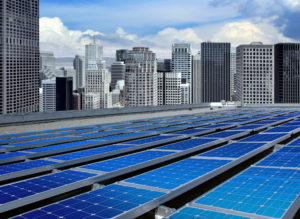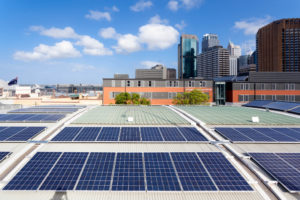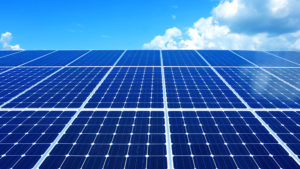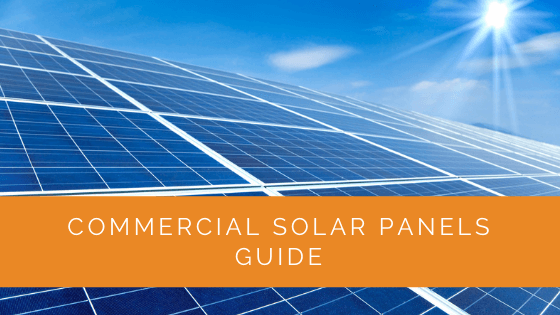It is time business owners equip their fancy roofs with worthwhile commercial solar panels. Running a massive corporation demands tons of energy and power. Do you know how much your business can save by going solar?
Those regular solar panels might not be sufficient to meet the extensive demands of your business upfront. However, for manufacturing units and other industrial spaces, a commercial solar panel is a perfect choice.
These commercial solar panels require minimal maintenance and offer an extended lifespan of 15 to 20 years. Are you already thinking of equipping your business location with an array of commercial solar panels?
Then, you’ve come to just the right place. This article contains the perfect guide to commercial solar panels. Let’s get started!
Contents
- 1 What Are Commercial Solar Panels?
- 2 How Does a Commercial Solar Panel Work?
- 3 What Are the Features of a Commercial Solar Panel?
- 4 What Are the Applications of a Commercial Solar Panel?
- 5 What is the Size of a Commercial Solar Panel?
- 6 How Much Do Commercial Solar Panels Cost?
- 7 What Are the Advantages of Commercial Solar Panels?
- 8 What is the Difference Between Commercial Solar Panels and Residential Solar Panels?
- 9 Case Study: Implementing Commercial Solar Panels in a Manufacturing Facility
- 10 Expert Insights From Our Solar Panel Installers About Commercial Solar Panels
- 11 Experience Solar Excellence with Us!
- 12 Final Thoughts
What Are Commercial Solar Panels?
Most industrial or commercial solar panels are substantially large. The regular residential panels are much smaller than the commercial solar panels. For perspective, the typical residential solar panel size is 8 kilowatts (kW).
On the other hand, a commercial solar panel can be several megawatts (MW) in size. Like residential solar panels, commercial panels also come in different sizes.
The commercial solar panels include an array of multiple PV panels that convert sunlight into electricity. These industrial solar panels use several solar arrays to generate more electricity.
You can consider commercial panels for distributed generation. In simpler words, devices will use the energy produced by the system at the near point of generation.
The distributed generation projects such as ground-mounted or rooftop usually connect to the electric grid. This system allows commercial properties to maximize the benefits of net metering.
Net metering is a policy allowing distributed generation customers to exchange unused energy for electricity bill credits.

How Does a Commercial Solar Panel Work?
The working of a commercial solar panel is pretty straightforward. The commercial solar panel gathers clean, renewable energy from the sun and converts it into electricity. Commercial buildings use this converted energy to carry out various activities.
The solar panels include several layers of individual solar cells that use phosphorus, silicon, and boron. The manufacturers arrange the different elements in a grid-like pattern.
The power generated by the collar panels travels to the inverter. Here, the inverter converts the solar panel’s DC power into AC power. The AC power is similar to the power that comes from the utility grid.
Generally, commercial inverter power levels are available in the range of 2.5 kW to 250 kW. These inverters have a versatile design to meet the requirements of commercial applications.
Commercial panels work like residential or regular solar panels with minor differences.
What Are the Features of a Commercial Solar Panel?
If you consider equipping your commercial space with solar panels, you might want to know its different features.
Here are some of the typical features of an industrial solar panel:
- You can install commercial solar panels on the roof or at any open space in commercial buildings. Commercial buildings have enough space to accommodate an array of solar panels.
- Commercial solar panels can generate a whopping amount of energy to meet your requirements.
- It offers enough power during the daytime. You can harness and store the energy for nighttime use.
- Compared to residential solar panels, commercial solar panels are more robust and durable. They use high-quality materials to tackle the different challenges of commercial spaces.
- Commercial solar panels perform heavy-duty jobs. Also, they have very few maintenance requirements.
- The lifespan of a commercial solar panel ranges from 15 to 20 years. Once you install them, they’ll generate electricity free of cost.
- You’ll also find varying sizes of commercial solar panels. You can pick a size based on the requirements of your commercial operation.
What Are the Applications of a Commercial Solar Panel?
The commercial solar panels are fit for heavy-duty purposes. Any space or location with staggering energy requirements can install a commercial solar panel. Here are some of the applications of a commercial solar panel:
- You can use commercial solar panels to power industrial equipment and buildings in remote or off-grid locations.
- It is also ideal for installing commercial solar panels on rooftops of buildings to illuminate messages and billboards. Solar energy will charge the battery so that the billboards receive light and are visible during the night.
- Commercial solar panels can also act as a power backup for industries with high energy demand. It may also be feasible to use commercial solar panels for fulfilling partial electricity requirements.
- These solar panels are apt for pre-heating ventilation air and even water heating in manufacturing spots and businesses.

What is the Size of a Commercial Solar Panel?
Commercial solar panels are not only popular for their massive energy production but also their size.
The average size of a commercial solar panel is about 77 inches by 39 inches. Most commercial buildings install several solar panels to create an array and generate a good amount of power.
The average weight of commercial solar panels is approximately 50 pounds. You’ll generally find 96 cells in commercial solar panels.
How Much Do Commercial Solar Panels Cost?
Each commercial solar panel is unique. Coming from different brands and sporting various features, it’s hard to make general statements about their costs.
The installation cost for the commercial solar panels might also vary depending on location, size, and other aspects.
Residential solar panel costs per watt ($/W) are a great deal lower than those of commercial panels. It is because of the economies of scale. As the efficiency, material, and size of the solar panels go up, so does the price.
Nevertheless, you’ll be content to know that the cost of commercial solar panels has dropped two-thirds since 2010. For the price range of a specific commercial solar panel, it is better to consult your nearest commercial solar panel dealer.
What Are the Advantages of Commercial Solar Panels?
You might be curious about the benefits of a commercial solar panel. Knowing the advantages will allow you to proceed with the purchase and installation process confidently.
Let us tell you that commercial solar panels bring tons of benefits to your commercial property. Here are some of them:
Forms a Positive Image
It is no secret that industries have been called out in the past years for harmful environmental activities. One qualitative benefit that comes from using commercial solar panels is publicity.
Both buyers and stakeholders will view the decision to go green as an impressive move. It’ll also display your commitment to giving back to the community and environment. A lot of businesses’ green operations are driving an increased return on investment.
Incentives
There are many forms of local incentives that come with using solar energy for your business. Municipalities make solar energy projects more fungible by smoothening the inspection process.
They facilitate shared solar models and also make exceptions in property assessment. Also, state-sponsored incentives can further reduce the weight of the upfront cost of installing a commercial solar panel.
Boost Commercial Property Value
Real estate buyers eagerly look for properties that are self-sufficient in terms of energy. A solar-powered commercial space allows lower operating costs for the owners.
Along with the ultimate property value, solar panels will also increase the equity value of your property. Research shows a 1:20 ratio for savings to increase in property value.

Tax Credit
Your business can enjoy a federal tax credit on installing commercial solar panels in your business location. It is 30% of the total cost of solar panel parts, labor, service costs, and installation.
You can additionally claim a reduction on the Modified Accelerated Cost Recovery Schedule (MACRs).
Savings on Utility Bills
One of the biggest perks of installing solar panels on your commercial property is the exemption from hiked energy bills. Once you install the commercial solar panels, you can enjoy free-of-cost energy. It will ultimately increase the net income of your business.
What is the Difference Between Commercial Solar Panels and Residential Solar Panels?
Home and company owners often look forward to switching to renewable and cheaper energy. However, they might feel perplexed about the differences between residential and commercial solar panels.
Here are a few points of difference between commercial solar panels and residential solar panels:
Size
It is a no-brainer that commercial solar panels are larger-sized than residential solar panels. The reason that residential solar panels are smaller is that the size of residential roofs is usually smaller.
Another reason for the difference in size is the energy requirement. In other words, a commercial space demands more energy than a residential one.
Efficiency
A commercial solar panel is ahead of the residential one in the efficiency race.
There is a difference of 2% in efficiency between commercial and residential solar panels. Also, commercial solar panels are bigger and produce more energy than regular solar panels.
Color
Generally, you’ll notice that commercial solar panels are white-colored while the residential ones are blue or black. Most often, businesses prefer black panels on a white backing.
Installation
The installation process of a commercial solar panel is no different from a residential solar panel. Both use a bolted racking system. Besides, commercial roofs are flat and facilitate an easier installation process.
You should also know that commercial solar panel systems might take weeks to install.
Case Study: Implementing Commercial Solar Panels in a Manufacturing Facility
Background
A large manufacturing facility faced rising energy costs and sought to improve its sustainability practices. The company aimed to reduce its carbon footprint while cutting down on electricity expenses. Solar Panels Network USA was contracted to design and install a commercial solar panel system that met these objectives.
Project Overview
The goal was to install a solar power system capable of offsetting at least 50% of the facility’s electricity consumption. Factors such as roof space, energy usage patterns, and budget were considered to design the optimal system.
Implementation
Initial Consultation and Assessment: Our team conducted a thorough assessment of the facility’s energy needs and roof space. We analyzed past energy consumption data to determine the appropriate system size and potential savings.
Customized Solution Design: We designed a 500 kW solar panel system using high-efficiency panels to maximize energy production. The design included both rooftop and ground-mounted panels to utilize all available space efficiently.
Installation: The installation process was planned to minimize disruption to the facility’s operations. The panels were installed on the roof and in adjacent open areas, with all necessary safety measures in place. The entire system was connected to the facility’s electrical grid, enabling net metering benefits.
Results
Energy Savings: The solar panel system now generates approximately 600,000 kWh annually, covering about 55% of the facility’s energy needs. This results in significant savings on electricity bills, reducing the company’s reliance on external power sources.
Environmental Impact: The facility’s carbon footprint has been substantially reduced, equivalent to planting over 10,000 trees annually. This green initiative has been well-received by both employees and customers.
Financial Incentives: The company benefited from federal tax credits and state incentives, which covered nearly 30% of the installation costs. Additionally, net metering allows the facility to receive credits for excess energy produced, further lowering electricity costs.
Corporate Image: Adopting solar energy has enhanced the company’s reputation as an environmentally responsible business. This commitment to sustainability has attracted new clients and strengthened relationships with existing partners.
Summary
This case study demonstrates the successful implementation of commercial solar panels in a manufacturing facility. By leveraging renewable energy, the company achieved significant cost savings, reduced its environmental impact, and improved its corporate image. Solar Panels Network USA continues to support businesses in making the transition to sustainable energy solutions, offering expertise and customized services to meet diverse needs.
Expert Insights From Our Solar Panel Installers About Commercial Solar Panels
Commercial solar panels are a game-changer for businesses looking to reduce operational costs and promote sustainability. The initial investment is substantial, but the long-term savings on utility bills and the environmental benefits make it worthwhile.
Chief Solar Technician
One of the most significant advantages of commercial solar panels is their scalability. Businesses can start with a smaller system and expand as their energy needs grow, ensuring they only pay for what they need at each stage.
Senior Solar Engineer
Installing commercial solar panels not only provides financial benefits but also enhances a company’s corporate image. Clients and partners appreciate the commitment to green energy, which can be a competitive advantage in today’s market.
Solar Project Manager
Experience Solar Excellence with Us!
Trust in Solar Panels Network USA, where our seasoned experts deliver top-quality solar solutions for homes and businesses nationwide. With a legacy of countless successful installations and a commitment to sustainable energy, we’re your reliable partner in the solar journey. Ready for a brighter, eco-friendly future? Call us now at (855) 427-0058 and harness the power of the sun!
Final Thoughts
You now know every essential detail of a commercial solar panel. This article discussed everything from the functioning to the advantages of commercial solar panels.
With various applications for commercial buildings, commercial solar panels will be a money-saving move for your business.
So, if you think your business can spare the budget for commercial solar panels, don’t delay your decision. Besides, with commercial solar panels, your business would also be fulfilling its duty towards the environment.
Thus, like many others in your industry, consider installing commercial solar panels and invite countless benefits to your business!
About the Author
Solar Panels Network USA stands at the forefront of solar energy solutions, driven by a team of seasoned solar engineers and energy consultants. With over decades of experience in delivering high-quality solar installations and maintenance, we are committed to promoting sustainable energy through customer-centric, tailored solutions. Our articles reflect this commitment, crafted collaboratively by experts to provide accurate, up-to-date insights into solar technology, ensuring our readers are well-informed and empowered in their solar energy decisions.

